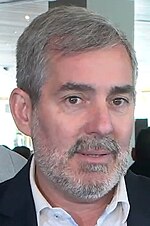
The President of the Principality of Asturias ; Asturian: Presidente del Principáu d'Asturies) is the head of government of the Spanish autonomous community of Asturias. The president is chosen by the General Junta of the Principality of Asturias, autonomous parliamentary institution.
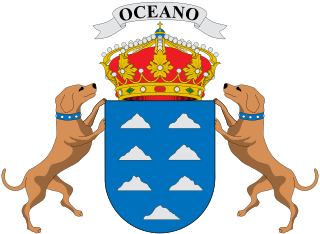
The president of the Canary Islands is the head of government of the Canary Islands, one of the 17 autonomous communities of Spain, while the monarch Felipe VI remains the head of state as king of Spain.

Jerónimo Saavedra Acevedo was a Spanish politician and academic. He served as President of the Canary Islands twice, from 1983 to 1987, and again from 1991 to 1993.

The Ministry of Territorial Policy and Democratic Memory (MPTMD), is the department of the Government of Spain which manages the policies of the government regarding relations and cooperation with the Autonomous Communities and with the entities that integrate the Local Administration and those related to the territorial organization of the country and with the Government Delegations and Sub-Delegations in the regions and provinces.
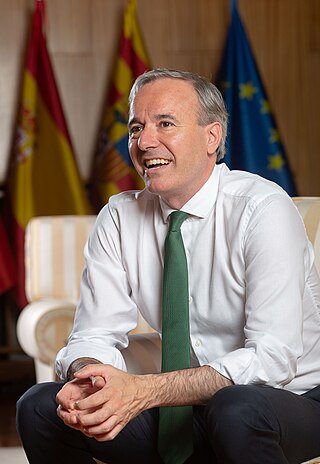
The president of the Government of Aragon, also known as the president of the General Deputation of Aragon or, simply, the president of Aragon, is the head of government of Aragon, an autonomous community in Spain. The President is elected to a four-year term by the Aragonese Corts.

The first government of Javier Lambán was formed on 6 July 2015, following the latter's election as President of the Government of Aragon by the Cortes of Aragon on 3 July and his swearing-in on 5 July, as a result of the Spanish Socialist Workers' Party (PSOE) and the Aragonese Union (CHA) being able to muster a majority of seats in the Cortes with external support from Podemos and United Left (IU) following the 2015 Aragonese regional election. It succeeded the government of Luisa Fernanda Rudi and was the Government of Aragon from 6 July 2015 to 6 August 2019, a total of 1,492 days, or 4 years and 1 month.
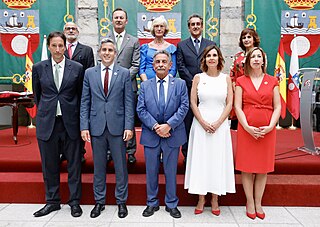
The second government of Miguel Ángel Revilla was the regional government of Cantabria during the 10th legislature (2019–2023).

The first government of Adrián Barbón was formed on 25 July 2019, following the latter's election as President of the Principality of Asturias by the General Junta of the Principality of Asturias on 15 July and his swearing-in on 17 July, as a result of the Spanish Socialist Workers' Party (PSOE) emerging as the largest parliamentary force at the 2019 regional election. It succeeded the second Fernández government and was the incumbent Government of the Principality of Asturias between 25 July 2019 and 31 July 2023, a total of 1,467 days, or 4 years and 6 days.

The second government of Fernando López Miras was formed on 1 August 2019, following the latter's election as President of the Region of Murcia by the Regional Assembly of Murcia on 26 July and his swearing-in on 29 July, as a result of the People's Party (PP) allying itself with Citizens (Cs) and mustering the external support from Vox in exchange for policy compromises following the 2019 Murcian regional election. It succeeded the first López Miras government and has been the incumbent government of the Region of Murcia since 1 August 2019, a total of 1,973 days, or 5 years, 4 months and 24 days.
The president of the Government of Navarre, is the head of government of the devolved government of the Chartered Community of Navarre.

The second government of Javier Lambán was formed on 7 August 2019, following the latter's election as President of the Government of Aragon by the Cortes of Aragon on 31 July and his swearing-in on 3 August, as a result of the Spanish Socialist Workers' Party (PSOE) emerging as the largest parliamentary force at the 2019 regional election. It succeeded the first Lambán government and was the Government of Aragon from 7 August 2019 to 12 August 2023, a total of 1,466 days, or 4 years and 5 days.

The first government of José Luis Rodríguez Zapatero was formed on 18 April 2004, following the latter's election as Prime Minister of Spain by the Congress of Deputies on 16 April and his swearing-in on 17 April, as a result of the Spanish Socialist Workers' Party (PSOE) emerging as the largest parliamentary force at the 2004 Spanish general election. It succeeded the second Aznar government and was the Government of Spain from 18 April 2004 to 14 April 2008, a total of 1,457 days, or 3 years, 11 months and 27 days.

The second government of Pedro Sánchez was formed on 13 January 2020, following the latter's election as Prime Minister of Spain by the Congress of Deputies on 7 January and his swearing-in on 8 January, as a result of the Spanish Socialist Workers' Party (PSOE) emerging as the largest parliamentary force at the November 2019 general election. It succeeded the first Sánchez government and was the Government of Spain from 13 January 2020 to 21 November 2023, a total of 1,408 days, or 3 years, 10 months and 8 days.

The 2023 Canarian regional election was held on Sunday, 28 May 2023, to elect the 11th Parliament of the Autonomous Community of the Canary Islands. All 70 seats in the Parliament were up for election. The election was held simultaneously with regional elections in eleven other autonomous communities and local elections all throughout Spain.
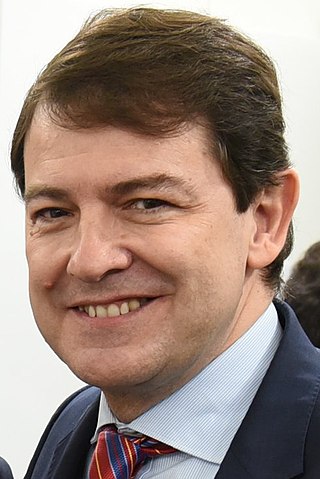
The second government of Alfonso Fernández Mañueco was formed on 20 April 2022, following the latter's election as President of the Junta of Castile and León by the Cortes of Castile and León on 11 April and his scheduled swearing-in on 19 April, as a result of the People's Party (PP) and Vox being able to muster a majority of seats in the Cortes following the 2022 Castilian-Leonese regional election. It succeeded the first Mañueco government and has been the incumbent Junta of Castile and León since 20 April 2022, a total of 980 days, or 2 years, 8 months and 5 days.
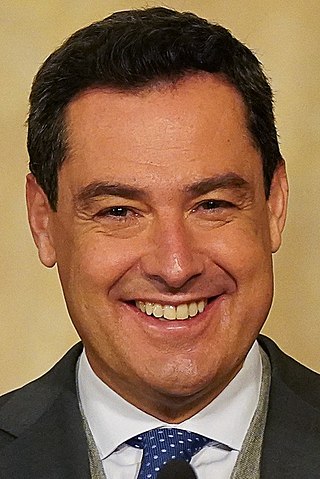
The second government of Juanma Moreno was formed on 26 July 2022, following the latter's election as President of the Regional Government of Andalusia by the Parliament of Andalusia on 21 July and his swearing-in on 23 July, as a result of the People's Party (PP) emerging as the largest parliamentary force at the 2022 Andalusian regional election with an absolute majority of seats. It succeeded the first Moreno government and has been the incumbent Regional Government of Andalusia since 26 July 2022, a total of 884 days, or 2 years and 5 months.

The government of Jorge Azcón was formed on 12 August 2023, following the latter's election as President of the Government of Aragon by the Cortes of Aragon on 10 August and his swearing-in on 11 August, as a result of the People's Party (PP) emerging as the largest parliamentary force at the 2023 regional election. It succeeded the second Lambán government and is the incumbent Government of Aragon since 12 August 2023, a total of 501 days.
